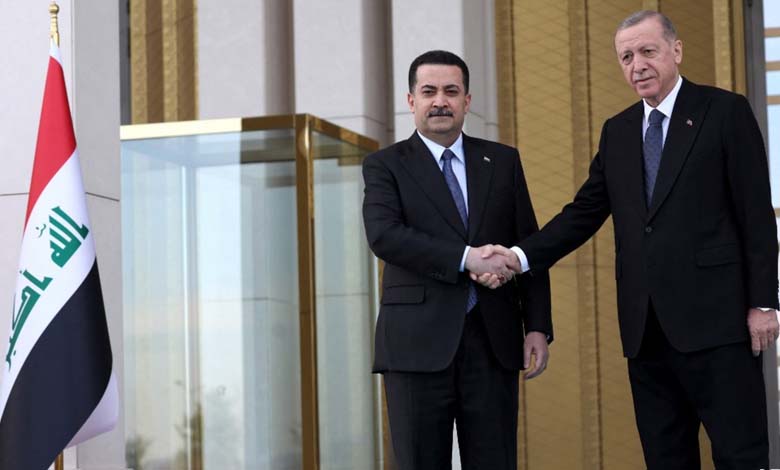Turkey Begins Arrangements for Erdogan’s Visit to Iraq
Turkish diplomacy has failed to resolve issues related to Turkish security violations of Iraqi sovereignty and the management of Kurdistan's oil exports and the water issue

Ahmet Yildiz, Turkish Deputy Foreign Minister, stated that President Recep Tayyip Erdogan would visit Iraq before the end of next April, apparently intending to resolve many contentious issues after diplomatic efforts between the two parties failed to resolve them.
Yildiz emphasized during statements on the sidelines of his visit to the Turkish Embassy in Baghdad and the Yunus Emre Cultural Center that he would begin his meetings with Iraqi officials on Wednesday. He clarified that talks would be held at the Iraqi Foreign Ministry to review bilateral relations and prepare for a ministerial-level meeting in the near future and Erdogan‘s visit.
The recent period has been marked by successive visits by Turkish officials to Iraq with the declared aim of paving the way for Erdogan‘s visit to Baghdad. However, in reality, they open a number of thorny files between the two countries, most notably energy, security, and water issues. With no indications that Turkish diplomatic efforts have succeeded in reaching solutions to the contentious issues with Iraq, it has provided an opportunity to launch a new dialogue on the lingering issues and explore the possibility of reaching a comprehensive deal between the two countries instead of fragmenting the files.
The Deputy Minister emphasized the importance of the Development Road project, which extends from Iraq to Turkey. He affirmed that the project would meet a significant need, especially since Turkey has a large economy and is a neighbor to Europe.
He added that Iraq also “had a large economy,” expressing his hope that it would return as it was. He stressed that both countries were enthusiastic about the project, adding, “We believe that if implemented, it will bring benefits (huge) that cannot be compared to its cost.”
Turkey is monitoring the Iraqi government‘s dealings with Iranian Kurdish opposition groups in Iraqi Kurdistan and the security agreement between Tehran and Baghdad in this regard.
Regarding Erdogan‘s planned visit to Iraq, Yildiz said, “According to the planning and preparations, the visit will take place before the end of April.”
The “Development Road” project includes a land road and railways, extending from Iraq to Turkey and its ports, starting from the Faw port in the Gulf of Basra (southern Iraq), with a length of 1200 kilometers inside Iraq, to be connected to the Turkish railway network.
The countries need understanding and coordination amid the complexities of economic, cultural, and security relations and differences in many core files, especially related to Turkish security violations of Iraqi sovereignty, managing Kurdistan’s oil exports, and the water issue. Also, divergent positions on many regional issues, especially the Syrian conflict.
The last official visit by Iraqi Prime Minister Mustafa Al-Kadhimi to Turkey in March last year was accompanied by a lot of optimism about the possibility of putting the relations of the two countries on the right track, especially in light of the two sides’ adoption of the “Development Road” project, which is supposed to enhance economic integration and cooperation between them. However, disputes have surfaced again after the International Chamber of Commerce issued a decision invalidating Turkey’s allowing Kurdistan to export its oil through the Jihan port, and as a result of Turkey’s escalating attacks in Iraq, which Ankara says target sites of the Kurdistan Workers’ Party (PKK).
There are other factors affecting the inability of the two parties to reach solutions to the contentious files, most notably the weakness of the Iraqi government and its inability to make – let alone implement – decisive decisions in some files, such as the presence of the PKK in Iraqi territory, and on the other hand, the Turkish tendency to view Iraq as a sphere of influence and confrontation rather than a partner, and Ankara’s preference to deal with multiple parties in the country instead of relying on the central government in Baghdad.
During his visit to Iraq, the Turkish Foreign Minister demanded that the Iraqi government officially classify the PKK as a terrorist organization, which appeared to be a direct attempt to force Baghdad to take a clearer position on this issue. Observers say that Turkey is monitoring the Iraqi government’s dealings with Iranian Kurdish opposition groups in Iraqi Kurdistan and the security agreement between Tehran and Baghdad in this regard, with Baghdad pledging to disarm those groups, which would reinforce Turkey’s demands for Baghdad to take a similar stance regarding the PKK.
However, the Iraqi government will hesitate to take this position quickly because it fears that it will give official cover to Turkish military activities in Iraqi territory. Given the potential opposition to this by Tehran and its Iraqi allies, who have coordination relations with the PKK and Iraqi and Syrian Kurdish factions, especially in the context of the joint confrontation with ISIS. Also, if the Sudanese government manages to overcome the objections of some allies, it is unlikely to give Ankara a free gift without getting a suitable price for this position.












